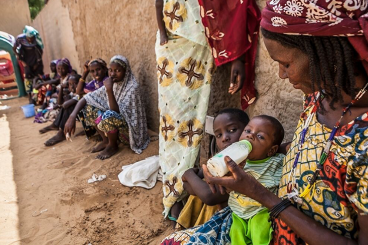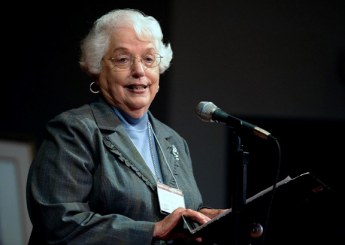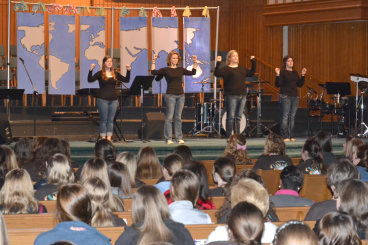Whipping desert winds fill the air with dust which settles on the clinic’s metal gate, muting its deep maroon color. A clinic worker opens the gate and two grandparents step into the clinic with their 2-month-old grandson. The grandmother and grandfather sit down.
The emaciated baby lies motionless on his grandmother’s lap. He closes his eyes. The only movement is the soft rise and fall of his chest as he breathes in the dry, hot afternoon air.
A clinic worker sits next to the woman and assesses her grandson’s nutritional condition. The clinic worker gives the grandmother a bottle of formula to feed her grandson and listens as the woman tells their story.
The baby’s mother died four days earlier, and he has not eaten since. His grandparents tried feeding him cow’s milk and rice water — two of the only food options for babies in this part of Africa — but he was losing weight. The grandparents took him to a clinic in a nearby village, hoping to find help. The workers there told them about this clinic, where families in need could receive baby formula provided by Southern Baptist’s Global Hunger Relief (GHR).
Most babies brought to the clinic are orphans or their mothers can no longer produce enough milk to feed them because of their own malnutrition. After an assessment of the baby’s nutritional needs, families are provided alternative resources to feed their babies.
A simple formula distribution project like this saves lives in sub-Saharan Africa, where an estimated 1 in 4 persons is undernourished. Each week the clinic distributes formula for 250–300 babies.
But distributing infant formula is only one way GHR combats hunger. In 2014 more than 36,000 people around the world received food as part of community development efforts and more than 200,000 as part of disaster response. More than 433,000 water needs were met.
Most effective channel
GHR is one of the most effective channels for donating toward the global hunger crisis. It is able to devote 100 percent of resources directly to meeting hunger needs because most administrative costs are covered through Cooperative Program giving.
GHR-funded projects meet crisis hunger needs in famine or disaster relief situations, but also catalyze long-term change in conditions of human suffering and extreme poverty that cause chronic hunger. Such projects may involve job training and vocational education, livestock and seeds, clean water, home reconstruction and hygiene education, etc.
Visit globalhungerrelief.com for resources to mobilize your church or other small group to help hungry souls and offer hope in the midst of suffering.
(BP)





Share with others: